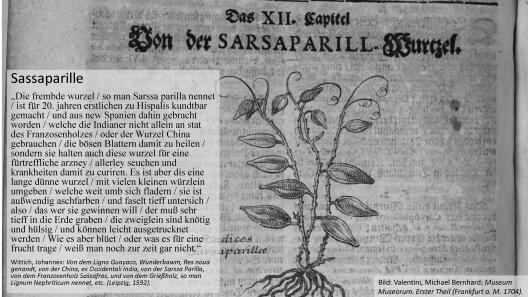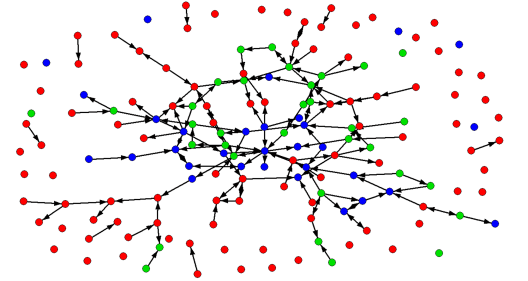Research
My research interests range from the consequences of European expansion and early globalisation for knowledge production and the material culture of Europeans, the history of consumer society, the analysis of historical social networks, the history of family, kinship and sponsorship, rural society, social inequality to digital historiography.

© Christine Fertig Non-European Drugs in the Old World. Global Trade, European Consumer Culture and Medical Knowledge in the German-Speaking World
This project examines the effects of knowledge production and debate about exotic substances for the transformation of consumer behaviour, medicinal culture and medical-pharmaceutical innovations. Decisive impulses came from the increasing intertwining and interaction with the non-European world, from encounters with foreign cultures, but also from the things and materials that found their way onto the European continent. The discovery of exotic plants and animals, the encounter with indigenous bodies of knowledge and the tasting of foreign culinary diets were experiences that permanently shook the European spheres of knowledge and knowledge production. Contacts with indigenous knowledge holders occurred in a context that was rarely free of institutional coercion, economic exploitation or simply slavery. However, the integration of indigenous knowledge into traditional bodies of knowledge also posed considerable problems for European scholars. On the European side, the reception of foreign knowledge often led to a reduction or reinterpretation that made integration into European horizons of thought possible in the first place. The foreign substances found their way into medical practice as well as into lay and folk medicine, until they became raw materials for the emerging pharmaceutical industry in the second half of the 19th century. The project follows these topics exemplarily for several exotic substances in order to explore the process of knowledge construction and systematisation in a European, global as well as colonial framework for the German-speaking region. It also contributes to the establishment of methods and procedures of digital history by transcribing sources using OCR (optical character recognition) and making them accessible to quantitative and qualitative analysis strategies in MAXQDA.
Publications and recent presentations:
Christine Fertig: Heilmittel aus aller Welt. Handel und kaufmännische Wissensproduktion im mitteleuropäischen Hinterland (1670–1840), in: Mark Häberlein, Peter Rauscher, and Andrea Serles (eds.): Nur die Hinterländer der Weltmeere? Kontinentaleuropäischer Handel im 17. und 18. Jahrhundert (Wien 2025, in Press).
Christine Fertig: Global drugs in the Central European hinterland. Commoditiy chains in the 18th century drug trade, 6. Kongress für Wirtschafts- und Sozialgeschichte, 17.-20.3.2025, Berlin, Germany.
Christine Fertig: ‚Exotische Heilmittel und Medikalisierung im ländlichen Raum. Wissenstransfer, globale Objekte und Akteure der Vermittlung‘, 15. Frühneuzeittag WissensWelten, Session ‚Wissenswelten im ländlichen Raum: Regionale Strukturen und globale Horizonte‘, organised by Christine Fertig (Antwerp/Münster) and Philip Hahn (Saarbrücken), 19.-21. September 2024, Gotha.
Christine Fertig: ‚Außereuropäische Heilmittel und das Wissen (von) der Welt. Globaler Handel, europäische Konsumkultur und Wissensproduktion im deutschsprachigen Raum (1670-1850)‘, Jahrestagung der Gesellschaft für Globalgeschichte: Ungleichheiten: Globalgeschichtliche Perspektiven, 06.-08.06.2024, Bremen.
Christine Fertig: Exotische Substanzen in der Alten Welt. Globaler Handel, europäische Konsumkultur und Wissensproduktion im deutschsprachigen Raum (1670-1850), Vortrag auf dem V. Kongress für Wirtschafts- und Sozialgeschichte 'Verteilung und Teilhabe: Konflikte in polarisierten Gesellschaften seit dem Mittelalter', 29.-31. März 2023, Leipzig.
Christine Fertig: Exotic Substances in Northwest Germany. Trade and Knowledge Production in the 18th Century, Vortrag auf der 14. European Social Science History Conference, 12.-15. April 2023, Göteburg, Schweden.
with Ulrich Pfister: Coffee, Mind and Body. Global material culture and the eighteenth-century Hamburg import trade, in: Anne Gerritsen and Giorgio Riello (ed.), The Global Lives of Things. The material culture of connections in the early modern world (London: Routledge, 2016), S. 221-240.
The consumer revolution and the changing consumption patterns of households as reflected in estate inventories (16th to early 19th century, northwestern Germany)
Funded by the German Research Foundation (DFG), this project (2020-2024) investigates the extent to which the thesis of an early modern consumer revolution applies to the north-west German hinterland of the European Expansion. The project analyses changes in the material culture of rural households between around 1550 and 1808. It goes beyond previous studies on Germany, which have largely focused on urban areas and thus only considered a small minority of the population.
The thesis of an early modern consumer revolution describes a change in material culture in which the needs of pre-modern households were increasingly met by purchasing market goods at the expense of household-based subsistence production. Accordingly, households were found to have, on the one hand, ever-larger quantities of differentiated manufactured goods and, on the other, globally traded colonial goods such as coffee, tea, sugar, porcelain, cotton, etc. This development affected not only the urban elite, who saw themselves as obliged to emulate the splendour of the nobility, but also, and increasingly, so the thesis goes, the middle classes in small towns and rural households. Populuxe goods – small, relatively cheap things like colourful ribbons or printed handkerchiefs that many people could afford – became more and more widespread in all social classes, and as a result set significant markers for the further development of material culture. The beginnings of this change are thought to have occurred in the 17th and 18th centuries. Until now, they have been discussed primarily in relation to the North Atlantic coastal regions, especially England and the Netherlands. The examination of changes in the material culture of premodern households from the perspective of the thesis of a consumption revolution touches on two historiographical discourses: on the one hand, the debate about the conditions for the Industrial Revolution and the ‘Great Divergence’; on the other hand, the analysis of the economic and consumption strategies of premodern households in the context of market formation.Publication:
Henning Bovenkerk / Christine Fertig: Consumer revolution in north-western Germany: Material culture, global goods, and proto-industry in rural households in the seventeenth to nineteenth centuries', The Economic History Review 76,2 (2023), 551-574.
Non-peasants in rural society - Servants, day labourers, Heuerlinge
The social situation of the rural lower classes has so far been addressed mainly in the context of research on pre-modern proto-industrialisation and poor relief. However, the living conditions of landless and land-poor households and the role of this part of the rural population, which has been growing significantly since the 18th century, for economic development has been little studied so far. The relevance of this question arises, among other things, from the fact that agricultural development, supported by labour intensification, was an important basis for the acceleration of population growth and industrialisation in the 19th century long before the agrarian reforms. My research focuses on three themes: First, the social places where landless families could settle. This refers both to geographical spaces - such as marginal locations that were not very attractive from an agricultural point of view - and to the proximity and distance of the places of residence to the peasant employers, who in some settings also acted as landlords of housing. Secondly, the labour relations between the landless and the farmers as the most important employers are examined. These were located along a line whose endpoints were, on the one hand, relatively close patron-client relationships, partly characterised by reciprocity, and, on the other hand, a far-reaching separation of personal and market labour relations. Both had implications for the local power structure, but also for the ability to deal with crises. Thirdly, developments in socio-economic structures, which can include processes of proletarianisation, but also reagrarianisation. Institutional and political change as well as changes in markets could open and close opportunities, for example by allowing access to land for other forms of economic activity than pure dependence on peasant employers. My work in this research field is based on the digital recording and analysis of population lists (including the Status animarum 1749/1750 of the prince-bishopric of Münster) and other sources, which will be made accessible to research in the medium term by processing them in a larger database. In terms of content, I am pursuing the question of the causes of different development paths, as initial studies have been able to demonstrate for various regions.
Related publicationsand presentations:
Christine Fertig: Public Outreach: Neben dem Hof. Heuerlinge, Tagelöhner und Gesinde in der ländlichen Gesellschaft (17. bis 19. Jahrhundert), 11. Westfälscher Genealogentag, 29.-30.3.2025, Altenberge, Deutschland.
Christine Fertig: Social class, rural economy and living standards in North-western Germany. The material culture of probate inventories in proto-industrial and agricultural communities, Presentation at the Rural History Conference 2023, 11.-14. September 2023, Cluj-Napoca, Rumänien.
Christine Fertig: Cottages, Barns and Bake Houses: Landless Rural Households in North-Western Germany in the Eighteenth Century, in: Christine Fertig, Henry French and Richard Paping (ed.), Landless Households in Rural Europe 1600-1900 (Woodbridge: Boydell & Brewer, 2022), p. 270-291.
Christine Fertig: Rural Servants in Eighteenth-Century Münsterland, Northwestern Germany: Households, Families and Servants in the Countryside, in: Jane Whittle (ed.), Servants in Rural Europe 1400-1900 (Woodbridge: The Boydell Press, 2017), p. 131-148.

© Christine Fertig Family, kinship and social networks
This research area investigates family strategies and the construction of social networks in Westphalian communities. In my PhD, the comparative micro-study focused on intergenerational resource transfer, marriage behaviour and the network structures of local communities in two rural parishes. Important results were firstly the classification of the idea of a 'rural class society' by pointing at dense social networks across social strata in at least one of the communities. A second central result concerns the identification of family strategies of peasants and non-peasants, which revealed pronounced ideas of inter- and intragenerational justice, contrary to popular concepts such as the 'patriarchal family' without much empirical evidence. Families developed solutions adapted to the actual situation and strived for a balance of interests within the family, but, contrary to the view established in older research, they were not very much oriented towards traditional procedures. Thirdly, it could be shown that the formal analysis of social networks, which has hardly been tested on historical material, can be successfully used for an investigation of historical societies and that by applying innovative methods such as formal network analysis, results can be achieved that go far beyond the current state of research.
Related Publications:
Christine Fertig: Kinship Networks in Northwestern German Rural Society (18th/19th Centuries), in: Marten Düring, Florian Kerschbaumer, Linda von Keyserlingk, et al. (ed.), The Power of Networks. Prospects of Historical Network Research (Turnhout: Routledge, 2020), S. 110-124.
Christine Fertig: Stem families in Rural Northwestern Germany? Family systems, intergenerational relations and family contracts, The History of the Family 23 (2018): 196-217.
Christine Fertig: Verwandte Paten und wohlhabende Freunde. Soziale Netzwerke im ländlichen Westfalen des 18. und 19. Jahrhunderts, in: Christine Fertig and Margareth Lanzinger (ed.), Beziehungen, Vernetzungen, Konflikte. Perspektiven Historischer Verwandtschaftsforschung (Wien: Böhlau, 2016), S. 185-208.
Christine Fertig: Hof, Haus und Kammer. Soziale Beziehungen und familiäre Strategien im ländlichen Westfalen, in: Thomas Brakmann and Bettina Joergens (ed.), Familie? Blutsverwandtschaft, Hausgemeinschaft und Genealogie. Beiträge zum 8. Detmolder Sommergespräch (Essen: Klartext Verlag, 2014), S. 105-130.
Christine Fertig: Soziale Netzwerke und Klassenbildung in der ländlichen Gesellschaft. Eine vergleichende Mikroanalyse (Westfalen, 1750–1874), Archiv für Sozialgeschichte 54 (2014): 25-53.
Christine Fertig: Familie, verwandtschaftliche Netzwerke und Klassenbildung im ländlichen Westfalen 1750-1874 (Stuttgart: Lucius&Lucius, 2012).
Christine Fertig: Rural Society and Social Networks in Nineteenth-Century Westphalia: The Role of Godparenting in Social Mobility, Journal of Interdisciplinary History 39 (2009): 497-522.
Christine Fertig: Hofübergabe im Westfalen des 19. Jahrhunderts: Wendepunkt des bäuerlichen Familienzyklus?, in: Christophe Duhamelle and Jürgen Schlumbohm (ed.), Eheschließungen im Europa des 18. und 19. Jahrhunderts: Muster und Strategien (Göttingen: Vandenhoeck & Ruprecht, 2003), S. 65-92.
Digital History - Historical Social Network Analysis, Text Mining and AI-assisted transcription of historical sources
The application of suitable ways of data acquisition, data collection and the linking of information from disparate sources formed the basis for detailed and methodologically sophisticated analyses already in my dissertation. In addition to the application of common statistical methods, I used formal social network analyses, drawing on various approaches within social network research. I have used well established methods of network analysis as well as highly specialized methods that allow, for example, the examination of genealogical data. The visualization of the results obtained is also one of the applied methods, which are particularly suitable for the presentation of network analyses. In this way I was able to show that the formal analysis of social networks, which has hardly been tested on historical material, can also be successfully used for an investigation of historical societies. In the context of the research field of material culture, innovative methods of digital text capture and analysis are being tested in addition to the methods of data collection, the collection and linking of sources in relational databases developed in the dissertation. The handwritten estate inventories collected in the DFG project "Consumer revolution and changes in household consumption in probate inventories in Northwestern Germany (16.-19. c.)" are well suited to test the performance of HRT systems (Handwritten Text Recognition) and to make the collection of handwritten mass sources accessible to digital processing. The development of such systems requires testing and qualified feedback from users to improve the reliability of text recognition.
Publications and presentations:
Christine Fertig: Exotic Substances in Northwest Germany. Trade and Knowledge Production in the 18th Century, Vortrag auf der 14. European Social Science History Conference, 12.-15. April 2023, Göteburg, Schweden.
Henning Bovenkerk / Christine Fertig: Consumer revolution in north-western Germany: Material culture, global goods, and proto-industry in rural households in the seventeenth to nineteenth centuries', The Economic History Review 76,2 (2023), 551-574.
[DOI: https://doi.org/10.1111/ehr.13192]Kinship Networks in Northwestern German Rural Society (18th/19th Centuries), in: Marten Düring, Florian Kerschbaumer, Linda von Keyserlingk, et al. (Hg.), The Power of Networks. Prospects of Historical Network Research (Turnhout: Routledge, 2020), S. 110-124.
Soziale Netzwerke und Klassenbildung in der ländlichen Gesellschaft. Eine vergleichende Mikroanalyse (Westfalen, 1750–1874), Archiv für Sozialgeschichte 54 (2014): 25-53.

